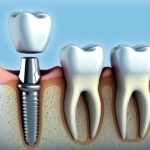Dental bridge in Cambridge, ON, are essential prosthetic devices designed to replace missing teeth, restoring not only the aesthetics of a smile but also the functionality of chewing and speaking. Acting as a bridge between natural teeth or dental implants, they play a crucial role in maintaining oral health and overall well-being.
The significance of oral health cannot be overstated. Beyond the obvious impact on our smiles, maintaining healthy teeth and gums is integral to preventing various dental issues, ensuring proper nutrition, and fostering overall self-confidence.
Overview of Dental Bridges
- Types of Dental Bridges
- Traditional Bridges: The most common type, anchored on either side by natural teeth.
- Cantilever Bridges: Supported on one side by adjacent natural teeth.
- Maryland Bridges: Secured with a framework made of either metal or porcelain.
- Materials Used in Dental Bridges
Dental bridges are crafted from various materials, including porcelain, ceramic, metal alloys, or a combination of these. The choice depends on factors like durability, aesthetics, and the location of the missing tooth.
- Common Reasons for Needing Dental Bridges
- Tooth Loss: Resulting from decay, trauma, or age-related factors.
- Enhanced Chewing Ability: Dental bridges restore the ability to chew properly, promoting better digestion.
- Improved Speech: Filling gaps helps in maintaining clear and articulate speech.
The Role of Cambridge Dental Clinic in Tooth Bridges Care
- Importance of Professional Guidance
Cambridge dental clinic stress the significance of seeking professional guidance for dental bridge care. Regular consultations ensure early detection of potential issues and personalized advice for optimal oral health.
- Regular Dental Check-ups and Cleanings
- Regular check-ups every six months are crucial to monitor the condition of dental bridges.
- Professional cleanings help prevent plaque buildup, maintaining the longevity of the prosthetic.
- Customized Care Plans
Our dentist in Cambridge develops individualized care plans, considering the patient’s overall oral health, lifestyle, and specific needs. This ensures a comprehensive and tailored approach to dental bridge care.
Daily Care Practices for Dental Bridges
- Oral Hygiene Routine
- Brushing Techniques
- Use a soft-bristled toothbrush to clean dental bridges gently.
- Employ circular motions, ensuring all surfaces are adequately cleaned.
- Flossing Guidelines
- Regular flossing helps remove debris and plaque between teeth and around the bridge.
- Use a floss threader or interdental brushes for effective cleaning.
- Recommended Dental Products
- Dental office near you recommends fluoride toothpaste and an antimicrobial mouthwash.
- Non-abrasive toothpaste helps maintain the integrity of dental bridge materials.
- Dietary Considerations
- Impact of Diet on Dental Bridge Health
- Limit consumption of sugary and acidic foods to prevent decay.
- Include a balanced diet rich in vitamins and minerals for overall oral health.
- Foods to Avoid
- Chewy or sticky foods can put undue pressure on dental bridges.
- Avoid excessive consumption of hard foods that may damage the prosthetic.
- Recommended Nutritional Practices
- Increase intake of calcium-rich foods for stronger teeth and bones.
- Stay hydrated to promote saliva production, aiding in natural cleansing.
Handling Dental Bridge Discomfort or Issues
- Recognizing Signs of Problems
- Persistent pain or discomfort around the dental bridge.
- Swelling or redness of the gums.
- Alterations in how the teeth meet or challenges experienced during mastication.
- Steps to Take in Case of Discomfort
- Rinse the mouth with warm saltwater.
- Gently floss around the bridge to remove any trapped debris.
- Emergency Procedures and Contact Information
In case of emergencies, such as a loose or broken bridge, contact Cambridge dental clinics immediately for guidance on interim measures and to schedule an urgent appointment.
Long-Term Maintenance Strategies
- Lifespan of Dental Bridges
When maintained correctly, dental bridges have a lifespan of 10 to 15 years, sometimes even longer. Consistent check-ups are crucial for overseeing their state and tackling any problems swiftly.
- Potential Issues and Solutions
- Regular examinations aid in early detection of wear or damage.
- Adjustments or replacements may be necessary over time, depending on individual wear patterns.
- Follow-up Appointments and Adjustments
Scheduled follow-up appointments to ensure that any necessary adjustments are made promptly, extending the lifespan of the dental bridge.
In conclusion, dental bridges not only restore smiles but also play a vital role in maintaining overall oral health. The guidance of professionals at Dental Art Clinics, combined with daily care practices, ensures the longevity and effectiveness of dental bridges.
Consistent and conscientious care is the key to preserving the investment in dental bridges. By following the recommended practices and seeking professional guidance, individuals can enjoy a healthy and confident smile for years to come.






